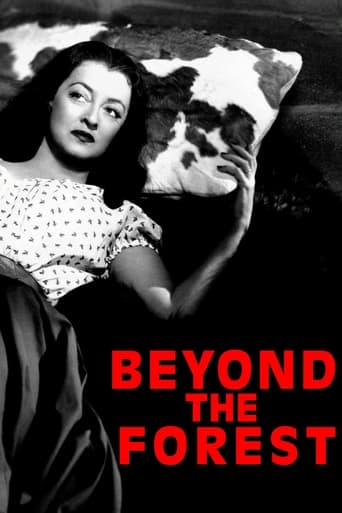tomsview
I have seen this film many times and it never fails to get me in. I am also aware of all the negative reviews it has received with plenty of trash talk using terms such as 'banal', 'overblown' and 'incredibly artificial'. But one description is definitely a backhanded compliment "One of the most enjoyable bad movies ever made".Anyway, who cares about all that, beauty is in the eye of the beholder after all.Recently - instead of getting a life - I watched three Bette Davis movies in one weekend: "All About Eve", "The Letter" and "Beyond the Forest". She was different in each one. Bette Davis had such a distinctive personality that it would be easy to think she just played herself in film after film, but not so. Her Rosa Moline in "Beyond the Forest" is a one-off; I don't think she ever played any other role that way again. Some say she was sending herself up. Apparently she didn't want to play the part and maybe her bad mood helped shape her character.I couldn't help thinking of "Madam Bovary" as I watched this film about a woman who leaves her husband to chase her dream. In Madam Bovary's case the dream was a romantic one; in Rosa's, the dream is more superficial; in both cases the dream turns into a nightmare.Rosa is married to the nice Doctor Lewis Moline (Joseph Cotton), but to her he is just poor and boring. Lewis is the respected doctor in the Wisconsin mill town where they live. Rosa latches onto Neil Latimer (David Brian), a rich businessman from Chicago, and plans to dump Lewis. He is about the only person in town who can't see through her, even their young Indian maid, Jenny (Dona Drake), has her measure. The scenes between Rosa and Jenny are very funny - the film needed a light touch to relieve the angst. It all ends in tears of course, played out in the flickering light of the massive incinerator that dominates the town.Bette Davis thought she was too old for the part, but doesn't that make her character just that much more pathetic? She feels life has passed her by, and she is making a last desperate grab for what she thinks she deserves.Much of the film was shot on location and has a rich look. Max Steiner contributed a powerful score, incorporating the melody "Chicago"; the theme for Rosa's yearning. His music actually has sympathy for Rosa; it understands her, even as it accompanies her to the inevitable tragedy."Beyond the Forest" is a movie where everything is a larger than life, including the emotions. I still think it is fantastic cinema.
jakeev67
Beyond the Forest is often considered one of Bette Davis' worst choices of roles in her career. Even she said so.After all, she was to old for the one film's lowest of characters in Rose Moline.But after 60 years, what may have been a bad choice for Bette actually turns out to be a cult, camp classic.After all, Rose was a despicable, careless woman who had no qualms killing her own unborn child.It might have the role that should have got away, but despite the junk, nobody could have done it better than Bette Davis.
Obituary666
...in fact, a deeply disturbing film! What's most disturbing is that back in those days, people were supposed to be shocked and disgusted with the character Rosa Moline, (needless to say, so brilliantly acted by Davis) but today, I'm sure a lot of viewers would sympathise with her desperation to get out of the confines of a dead-end life. From the beginning, we learn of her hatred for life- her husband being a doctor is a sick irony!If morbid humour is your thing, then you'll love this film. Especially when she says things along the lines of "the only people who are doing a worthwhile job in this town are the undertakers who carry the dead out of here". The only flaw in this film, is the ending. Not enough explanation is given. Give it a try.
Geofbob
It was interesting seeing this soon after seeing The Man Who Wasn't There, the Coen brothers would-be 40s film-noir. Both movies are set in small towns, have way-out plots involving violent crime and illicit love, and feature main protagonists trying to get out of a rut. But whereas the Coens' nouveau-noir plays it deadpan, philosophical and slow, and thereby risks boring the audience stiff; the genuine article with King Vidor at the helm, races along, goes way over the top, and glues the viewer to the screen.
Melodramatic and flawed though it may be, I don't go along with those who regard the movie merely as a camp vehicle for some arch Bette Davis overacting as the "evil" Rosa Moline. This film has genuine substance and potency, and Hedda Gabler-like Rosa's near-hysterical exasperation with the suffocating small town atmosphere - symbolised by the ever-present smoke and dust from the local sawmill - and with her dull, worthy, medico husband (Joseph Cotton), must have rung a bell with many American and other women in the stifling post-war years. Her "What a dump!" quite probably echoed their inner thoughts, as may her reluctance to have a baby (contrasted in the film with another woman's eighth, delivered by the good doctor). Moreover, despite Davis playing a woman at least 10 years younger than her actual age, her scenes with David Brian as her wealthy lover are truly erotic, and some of the lines may raise eyebrows even today.Those who dismiss this film should perhaps give it another chance, try to place it in the context of its era, and possibly ponder on how some of the "cool" masterpieces of today will be viewed by their grandchildren in 50 years time.






